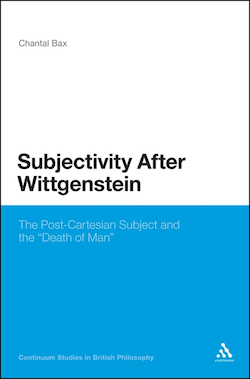Chantal Bax’s Subjectivity After Wittgenstein: The Post-Cartesian Subject and the “Death of Man” is now available in paperback from Bloomsbury Academic.
 Although Wittgenstein is often held co-responsible for the so-called death of man as it was pronounced in the course of the previous century, no detailed description of his alternative to the traditional or Cartesian account of human being has so far been available. By consulting several parts of Wittgenstein’s later oeuvre, Subjectivity after Wittgenstein aims to fill this gap. However, it also contributes to the debate about the Cartesian subject and its demise by discussing the criticism that the rethinking of subjectivity received, for it has been argued that the anti-Cartesian turn in continental philosophy has lead to a loss of a centre for both ethics and politics. By further exploring the implications of the Wittgensteinian account of human being, this book makes it clear that a non-Cartesian view on the subject is not necessarily ethically and politically inert. Moreover, it argues that ethical and political arguments should not automatically take precedence in a debate about the nature of man.
Although Wittgenstein is often held co-responsible for the so-called death of man as it was pronounced in the course of the previous century, no detailed description of his alternative to the traditional or Cartesian account of human being has so far been available. By consulting several parts of Wittgenstein’s later oeuvre, Subjectivity after Wittgenstein aims to fill this gap. However, it also contributes to the debate about the Cartesian subject and its demise by discussing the criticism that the rethinking of subjectivity received, for it has been argued that the anti-Cartesian turn in continental philosophy has lead to a loss of a centre for both ethics and politics. By further exploring the implications of the Wittgensteinian account of human being, this book makes it clear that a non-Cartesian view on the subject is not necessarily ethically and politically inert. Moreover, it argues that ethical and political arguments should not automatically take precedence in a debate about the nature of man.
“Wittgenstein is widely acknowledged to have mounted a sustained and, if successful, devastating challenge to the view of human subjectivity that belongs to the traditional discourse of European modernity: the broadly ‘Cartesian’ view of Man as a rational thinking subject. But at what cost? Can we make sense of concepts central to contemporary ethics and politics—concepts of rights, of autonomy, and of responsibility in particular—if we do not retain that conception. Rejecting it can seem tantamount to a rejection of those central concepts. In this important new study Chantal Bax offers a compelling account of why a Wittgensteinian understanding of the fundamental sociality of the human subject encourages rather than discourages us to engage with questions at the heart of our ethical and political lives.”
—Simon Glendinning, Reader in European Philosophy, European Institute, London School of Economics and Political Science, UK








